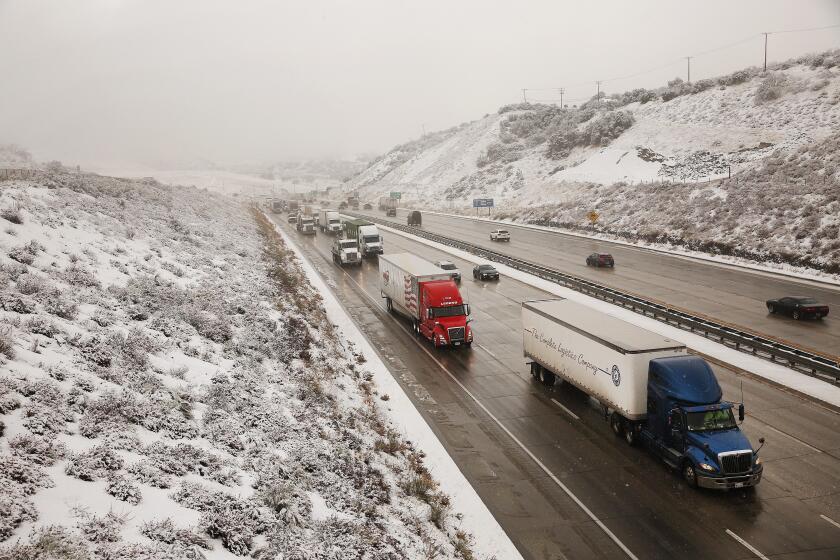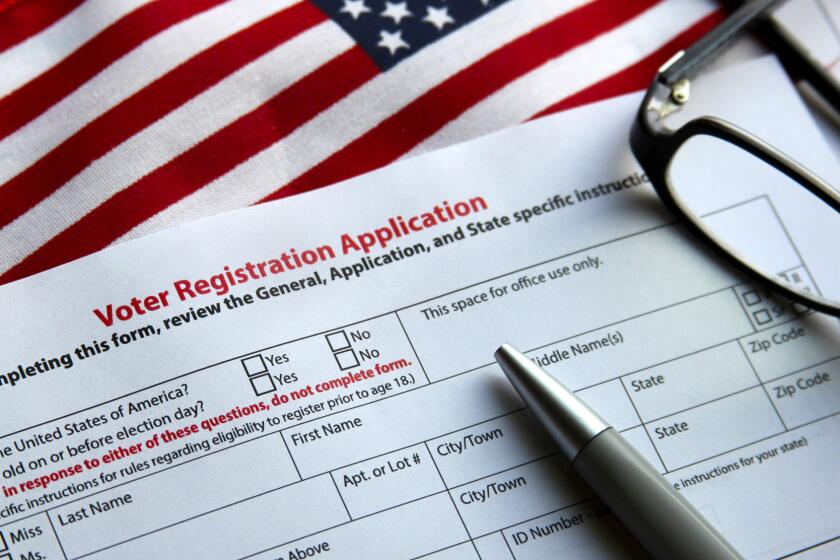Truckers Feel the Burn of Deregulation : Unfettered competition helps some firms, but workers pay the price in lost wages, benefits.
Conservatives and even some liberals are increasingly trying to peddle the muddled theory that cutthroat competition in a market economy is great for everyone, everywhere.
That isn’t true even in America, where most often it is the average worker who gets bashed by unlimited competition while corporations increase their profits.
A particularly grievous example is the trucking industry, just ending a bitter Teamsters union strike. Despite the destructive battle with the trucking firms, the union won some gains in a strike that stemmed largely from the impact of President Jimmy Carter’s misguided push for deregulation of the industry in 1979.
From 1935, when regulation began, until it was killed 44 years later, shipping rates, routes and entry into the trucking industry were controlled by the Interstate Commerce Commission and the Department of Transportation.
Advocates of deregulation argued that it was true free enterprise, ignoring the fact that the highways used by the truckers are paid for by taxpayers, unlike the “highways” used by trains, since tracks are financed by railroad companies.
Thousands of trucking firms went bankrupt after 1979, and thousands of others that entered the industry were forced to cut costs wherever possible, mostly by taking income away from their workers.
Truckers began competing for business by hiring non-union workers willing to accept low wages, few benefits and few on-the-job work rules to protect them from abuse.
Deregulation was the battle cry of the Reagan Administration; many other industries, including airlines, were affected. But it was Carter, a Democrat, representing a party traditionally viewed as a friend of workers, who started trucking deregulation.
The result has been a mess, especially for drivers. A 1990 study published by the Economic Policy Institute showed that truckers’ wages plummeted by 27%, or $6,700, from 1978 to 1990, and they are still dropping. The Teamsters’ membership dropped drastically, but the union protected remaining drivers from the worst hits.
The study, by Michael Belzer of Cornell University, found that union drivers in 1990 were averaging about $41,000 a year, compared with $26,912 for the non-union workers. That differential in wages--and even more in benefits--was the fundamental cause of the latest strike. Unionized carriers said they could not compete with the non-union wages and work rules permitted under deregulation.
When the industry was regulated, wages weren’t bad, profits were pretty good and shipping rates were not inordinately high. With deregulation, thousands of profitable trucking firms went bankrupt while thousands more replaced them, often small firms whose trucks were owned and operated by drivers willing to put in long hours for little pay and heavy debt on their rigs.
There were 900,000 trucking-industry workers before deregulation; about 50% were union members. Now there are an estimated 1.4 million, with only 20% union members. Non-union workers are struggling for jobs by offering their services for lower wages and benefits and longer hours--often supported by drug use.
When Congress gave most workers protections under the Fair Labor Standards Act in the 1935, it decided that trucking workers didn’t need minimum-wage and -hour laws because most of truckers had better protections under their union contracts.
But with the growth of the non-union sector, truckers need to be included under the labor-standards law that requires employers to limit hours of work and pay extra for overtime and offers other forms of protection from abusive employers.
The cutthroat competition that has impoverished workers helps explain why the rich keep gaining and the poor keep losing. One pertinent point: While the average worker’s real wage adjusted for inflation declined 12.6% from 1979 through 1993, the rich didn’t suffer. While the CEOs at America’s 200 largest companies made 40 times the pay of the average worker in l975, now the top execs’ pay is 157 times that of the average worker.
Free-marketeers argue that unencumbered competition results in substantial savings for shippers and thus for consumers. But most of the money saved was pocketed by shippers and manufacturers. And the savings, some due to increased efficiency because of ruthless competition, apparently came mostly from the pockets of hundreds of thousands of workers who once held jobs with decent wages.
The unfettered free market may work in some industries, but it has surely failed badly in others, such as trucking.
More to Read
Get the L.A. Times Politics newsletter
Deeply reported insights into legislation, politics and policy from Sacramento, Washington and beyond. In your inbox three times per week.
You may occasionally receive promotional content from the Los Angeles Times.









